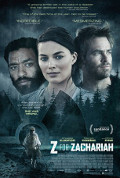
Directed by
Craig Zobel
95 minutes
Rated M
Reviewed by
Bernard Hemingway

Z For Zachariah
Synopsis: Somewhere in the Southern States of America a verdant valley has inexplicably been spared the devastation of a nuclear catastrophe that has wiped most of humanity off the face of the known earth. Ann (Margot Robbie) is a young woman who lives alone on a farm having been left there by her father and brother who went in search of survivors but never returned. One day an older black male, John Loomis (Chiwetel Eijofor) turns up suffering from radiation sickness and Ann nurses him back to health. The two grow close until a third person Caleb (Chris Pine), a handsome, younger white male wonders into their world and the dynamics change.
Z for Zachariah is a modestly-scaled drama freely adapted from a posthumously-published novel 'Mrs. Frisby and the Rats of Nimh' by Robert C. O'Brien which apparently only had two characters. One can understand why the third was added for the screen. Until Caleb arrives little happens in Craig Zobel’s unhurried, near pastoral film other than charting the warming of the platonic relationship between Ann and John Loomis as they share the tasks of surviving in these novel circumstances. Not that that seems particularly hard to do. Ann is a dab hand at growing veggies it seems, there are abandoned stores with plenty of provisions nearby and as John is an engineer from “up North” he is a resourceful problem-solver including coming up with a scheme to generate electricity that only slightly problematically involves dismantling for its timbers the church built by Ann’s father.
Zobel purposefully keeps the reins tightly-held on the drama and the burgeoning of Ann and John relationship is largely obliquely addressed and when it does manifest in physical form, John actually deflects it. It is little surprise given that one can’t help but be reminded of the poetically languorous, “dilapidated South” films of David Gordon Green (Zobel’s film was actually shot in New Zealand) to find that Z for Zachariah was lensed by that director’s regular cinematographer, Tim Orr.
Perhaps because of the evident influence of Green, Zobel does not quite manage to achieve the same degree of verisimilitude – given the extraordinary circumstances everything seems too easy, too tidy (the most striking instance is the water wheel that is built and installed) thus creating a kind of disjunction between the post-apocalyptic setting of the story and a desire to keep a quotidian mundanity in tone. Similarly each character feels a little too politely self-contained to convince as flesh-and-blood people sharing the end of days.
Talented Australian actress Margot Robbie does a convincing job of portraying the winsome inexperienced farm girl and she and Pine are well matched as a couple of rural types but Eijofor seems to be having trouble reconciling his character's rather improbable paternalistic demeanour with his ardent attraction for Ann, even in the latter stages as the three have an al fresco meal. As Tobey Maguire, who is one of the film’s producers was originally cast in the role one wonders what was Zobel’s conception of the character (who one assumes is the “Z” of the film’s title and represents the Omega to the Alpha of the Biblical Adam we see in a book he holds at one stage).

Want more about this film?


Want something different?




